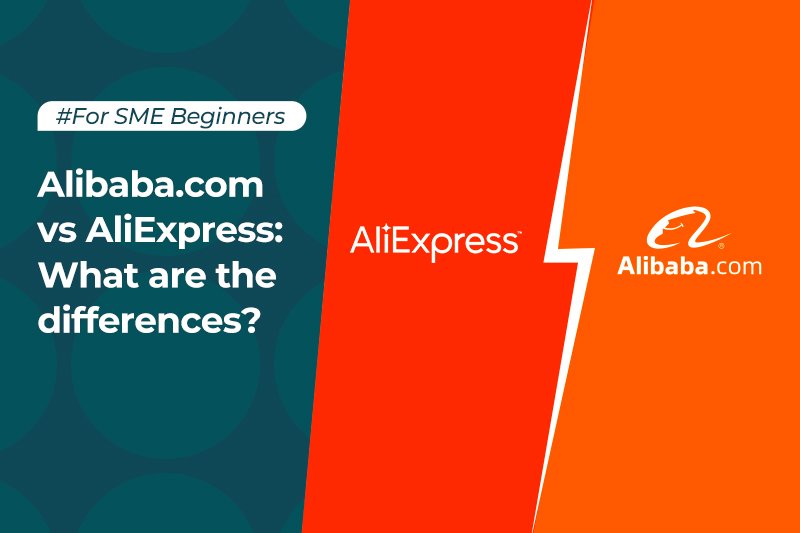A Comprehensive Comparison
- AliExpress vs Alibaba:
In the rapidly evolving landscape of e-commerce, AliExpress and Alibaba stand out as two of the most prominent platforms originating from China. Both platforms are under the umbrella of the Alibaba Group, yet they serve distinct markets and offer unique advantages. Understanding the differences between AliExpress and Alibaba is crucial for businesses and consumers alike. This article aims to provide a comprehensive comparison, exploring their business models, target audiences, pricing structures, product offerings, shipping logistics, and user experiences.
Overview of AliExpress and Alibaba
AliExpress
Launched in 2010, AliExpress is an online retail service primarily geared towards individual consumers. It operates as a global marketplace, allowing small businesses in China and other locations to sell products to international buyers. AliExpress functions similarly to eBay or Amazon, offering a vast array of products across various categories such as electronics, fashion, home goods, and more. It is particularly popular among consumers looking for affordable goods and unique items that may not be available in their local markets.

Alibaba
Founded in 1999, Alibaba is a leading business-to-business (B2B) e-commerce platform. It connects manufacturers and wholesalers with businesses around the world, facilitating bulk purchases and large-scale transactions. Alibaba’s primary users are businesses seeking to source products at wholesale prices for resale or production purposes. Unlike AliExpress, Alibaba is not a direct-to-consumer platform but rather focuses on bulk orders and long-term supplier relationships.

AliExpress vs Alibaba.
Business Models
AliExpress: Direct-to-Consumer (D2C)
AliExpress operates on a direct-to-consumer model, where individual consumers purchase products directly from sellers. The platform acts as an intermediary, providing a marketplace for small businesses and individual sellers to reach a global audience. AliExpress handles various aspects of the transaction, including payment processing, dispute resolution, and customer service, ensuring a smooth purchasing experience for buyers.
AliExpress vs Alibaba
Key features of the AliExpress business model include:
– Wide Product Range: AliExpress offers millions of products across numerous categories, catering to diverse consumer needs.
– Affordable Prices: The platform is known for its competitive pricing, often providing products at lower prices than local markets.
– Buyer Protection: AliExpress implements buyer protection policies, including secure payment methods and dispute resolution mechanisms to safeguard consumers.
Alibaba: Business-to-Business (B2B)
Alibaba’s business model is fundamentally different, focusing on connecting manufacturers and wholesalers with businesses seeking to source products in bulk. The platform facilitates large-scale transactions, providing tools for businesses to negotiate prices, arrange shipping, and establish long-term supplier relationships.
Key features of the Alibaba business model include:
– Bulk Purchasing: Alibaba is designed for bulk orders, allowing businesses to purchase large quantities of products at wholesale prices.
– Supplier Network: The platform boasts a vast network of manufacturers and suppliers, offering a wide range of products for various industries.
– Customization Options:
Many suppliers on Alibaba offer customization services, enabling businesses to tailor products to their specific needs.
Target Audiences
AliExpress
AliExpress primarily targets individual consumers looking for a convenient and cost-effective way to purchase products online. Its user base includes:
– Global Shoppers: AliExpress attracts shoppers from around the world, particularly those seeking affordable products and unique items.
– Bargain Hunters: The platform is popular among consumers looking for deals and discounts on a wide range of products.
– Tech Enthusiasts: AliExpress is known for its extensive selection of electronics and gadgets, appealing to tech-savvy consumers.

Alibaba
Alibaba’s target audience consists of businesses and entrepreneurs looking to source products in bulk. Its user base includes:
– Retailers: Businesses that purchase products wholesale to resell in their own stores or online platforms.
– Manufacturers: Companies seeking raw materials or components for production purposes.
– Dropshippers: Entrepreneurs who use Alibaba to source products for dropshipping businesses.

AliExpress vs Alibaba.
Pricing Structures
AliExpress
AliExpress is renowned for its competitive pricing, making it an attractive option for individual consumers. The platform offers a wide range of price points, catering to budget-conscious shoppers and those willing to spend more on premium products. Key aspects of AliExpress pricing include:
– Low Prices: Many products on AliExpress are available at significantly lower prices than in local markets, due to direct sourcing from manufacturers.
– Discounts and Promotions:AliExpress frequently runs sales, discounts, and promotional events, offering additional savings to consumers.
– Shipping Costs: While many products offer free shipping, some items may have additional shipping charges depending on the seller and destination.
Alibaba
Alibaba’s pricing structure is designed to accommodate bulk purchasing, providing significant cost advantages for businesses. Key aspects of Alibaba pricing include:
– Wholesale Prices:
Products on Alibaba are sold at wholesale prices, often much lower than retail prices, making it cost-effective for businesses to purchase in large quantities.
– Minimum Order Quantities (MOQs):Many suppliers on Alibaba require minimum order quantities, which can range from a few units to thousands, depending on the product and supplier.
– Negotiable Price: Alibaba allows buyers to negotiate prices with suppliers, potentially securing even better deals for bulk orders.
Product Offerings
AliExpress
AliExpress offers an extensive range of products across numerous categories, including:
– Electronics: Smartphones, tablets, laptops, accessories, and more.
– Fashion: Clothing, shoes, accessories, and jewelry for men, women, and children.
– Home and Garden: Furniture, decor, kitchenware, gardening tools, and more.
– Health and Beauty: Skincare, makeup, personal care products, and health supplements.
– Sports and Outdoors: Sporting goods, outdoor equipment, and fitness accessories.
Alibaba
Alibaba’s product offerings cater to businesses across various industries, including:
– Manufacturing: Raw materials, machinery, industrial equipment, and components.
– Consumer Goods: Electronics, apparel, home goods, and more, available for bulk purchasing.
– Agriculture: Agricultural products, machinery, and supplies.
– Packaging and Printing: Packaging materials, printing equipment, and supplies.
– Health and Medical: Medical equipment, pharmaceuticals, and healthcare products.
Shipping and Logistics
AliExpress
AliExpress offers a range of shipping options to accommodate different delivery needs. Key aspects of AliExpress shipping include:
– Varied Shipping Methods: Sellers on AliExpress offer multiple shipping options, including standard shipping, expedited shipping, and ePacket delivery.
– Delivery Times: Shipping times vary depending on the seller, shipping method, and destination. Standard shipping can take several weeks, while expedited options offer faster delivery.
– Tracking and Insurance: Many shipping methods on AliExpress include tracking and insurance, providing peace of mind for buyers.

Alibaba
Alibaba’s shipping and logistics are tailored to bulk orders and international trade. Key aspects of Alibaba shipping include:
– Freight Options: Alibaba offers various freight options, including sea freight, air freight, and express shipping, to accommodate different order sizes and delivery requirements.
– Shipping Negotiations: Buyers can negotiate shipping terms and costs with suppliers, potentially reducing overall logistics expenses.
– Customs and Duties: Businesses purchasing from Alibaba need to consider customs regulations and duties, which can vary by country and product type.

User Experience
AliExpress
AliExpress prioritizes user experience, offering a range of features to enhance the shopping experience for individual consumers. Key aspects of AliExpress user experience include:
– User-Friendly Interface: The platform features an intuitive interface, making it easy for users to browse, search, and purchase products.
– Customer Reviews and Ratings: AliExpress provides customer reviews and ratings for products and sellers, helping buyers make informed decisions.
– Mobile App: AliExpress offers a mobile app for convenient shopping on-the-go, with features such as push notifications and personalized recommendations.
Alibaba
Alibaba’s user experience is designed to facilitate B2B transactions and long-term supplier relationships. Key aspects of Alibaba user experience include:
– Comprehensive Search Tools: Alibaba offers advanced search tools and filters, allowing businesses to find specific products and suppliers efficiently.
– Communication Channels: The platform provides multiple communication channels, including messaging and video conferencing, to facilitate negotiations and relationship building.
– Trade Assurance: Alibaba offers trade assurance services, providing protection for buyers in terms of payment security, product quality, and on-time delivery.
Payment Methods
AliExpress
AliExpress supports a variety of payment methods to accommodate global consumers, including:
– Credit and Debit Cards: Visa, MasterCard, American Express, and other major credit and debit cards are accepted.
– Online Payment Systems: PayPal, WebMoney, and other online payment systems are available for secure transactions.
– Local Payment Methods:
AliExpress supports local payment methods in various countries, such as Boleto in Brazil and Qiwi in Russia.

Alibaba
Alibaba offers multiple payment options for businesses, including:
– **Bank Transfers**:
Wire transfers and other bank transfer methods are commonly used for bulk transactions.
– Credit and Debit Cards:
Major credit and debit cards are accepted for smaller transactions.
– Escrow Services:
Alibaba provides escrow services to protect both buyers and sellers, ensuring funds are only released once the transaction is complete.

Customer Support
AliExpress
AliExpress provides customer support to assist individual consumers with their purchases. Key aspects of AliExpress customer support include:
– Help Center:
The platform features a comprehensive help center with FAQs, guides, and troubleshooting tips.
– Live Chat:
AliExpress offers live chat support for real-time assistance with orders and inquiries.
– Dispute Resolution:
The platform provides dispute resolution services to mediate conflicts between buyers and sellers.
Alibaba
Alibaba’s customer support is tailored to the needs of businesses engaging in B2.
AliExpress vs Alibaba.

